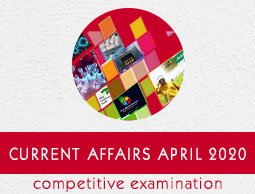
- Appointments
- Awards
- Bills & Acts
- Books & Authors
- Committees
- Deaths
- Defence
- Economic
- Environment
- Finance
- Important Days
- International
- Miscellaneous
- National
- Persons in News
- Places in News
- Regional
- Reports
- Resignations
- Science & Technology
- Sports
- COVID-19 SPECIAL
- April 2020 - Exams Resources
- Current Affairs - Quiz
- Current Affairs - Test
- Current Affairs - PDF
Current Affairs April 2020 - Reports
1 - UN report predicts 40 Crore Indian workers to go into poverty due to Corona-19 pandemic

The International Labour Organization (ILO) in its report titled 'ILO Monitor 2nd edition: Covid-19 and the world of work', has described coronavirus pandemic as "the worst global crisis since World War II". The report has predicted about 400 million people working in the informal economy in India are at risk of falling deeper into poverty, due to the coronavirus crisis.
The report said the disruption to the world's economies caused by the covid-19 pandemic is expected to wipe out 6.7% of working hours globally in the second quarter of this year which is equivalent of 195 million jobs worldwide.
2 - Forbes billionaires list unveiled The Richest in 2020

Forbes unveiled the 34th annual worlds billionaires list named as The Richest in 2020. Jeff Bezos is the worlds wealthiest person for the third year in a row at $113 billion followed by Bill Gates ($98 bn) at 2nd spot and Bernard Arnault ($76 bn) at 3rd spot.
Alice Walton, heir to the Walmart fortune, is the richest woman, ranked No.9 at $54.4 billion. The U.S. remained the country with the most billionaires followed by greater China. The worlds billionaires are worth $8 trillion, down $700 billion from 2019.
3 - India ranked high on Oxford COVID-19 Government Response Tracker

Governments took a wide range of measures in response to the COVID-19 outbreak. Oxford COVID-19 Government Response Tracker aims to track and compare policy responses around the world among 73 countries. The Oxford COVID-19 Government Response Tracker identified India's response to Covid-19 as one of the most stringent in the world.
Czech Republic, Itay, Lebanon and France scored in the 90s in the index. Germany and the United States have scored below these countries in the 80s. The tracker is created by researchers from Blavatnik School of Government at the University of Oxford.
4 - PM Modis approval ratings increase between January 1 and April 14
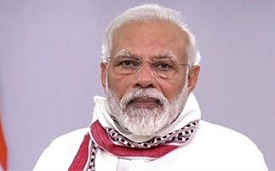
According to a survey conducted between January 1 and April 14 by Morning Consult, a US-based survey research firm, the approval ratings for Prime Minister Narendra Modi increased from 62% to 68%. It is the highest among 10 world leaders during the global coronavirus pandemic.
Mr Modis popularity turned out to be better than world leaders such as UK PM Boris Johnson, US President Donald Trump, Canada PM Justin Trudeau, German Chancellor Angela Merkel. The data was based on 447 daily interviews per non-US leader conducted and 7,039 for US President Donald Trump.
5 - United Nations World Food Programme released Global Annual Report
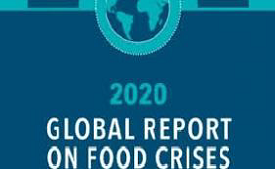
The United Nations (UN) World Food Programme (WFP) released its fourth annual Global Report on Food Crises. According to the report, number of people in food crisis rose by nearly 10% to 123 million people. The coronavirus pandemic could nearly double the number of people around the world facing acute hunger.
The number of people facing acute food insecurity stands to rise to 265 million in 2020, up by 130 million from the 135 million in 2019, as a result of the economic impact of Covid-19.
6 - India ranked 142nd on global press freedom index
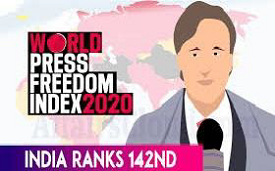
According to "The World Press Freedom Index 2020", India has dropped two places to be ranked 142nd out of 180 countries in the annual Reporters Without Borders analysis. Pakistan dropped three places to 145, and Bangladesh dropped one place to 151.
Norway is ranked first in the Index and China is at 177th. North Korea is placed at the bottom at 180th. Paris-based Reporters Sans Frontieres (RSF), or Reporters Without Borders, is a non-profit organisation that works to document and combat attacks on journalists around the world.
7 - World Bank released South Asia Economic Focus report
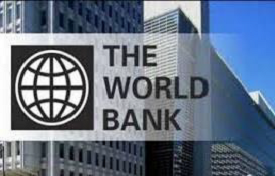
World Bank released a report titled South Asia Economic Focus.
The highlights are as follows:
The regional growth will get dropped to a range between 1.8% and 2.8% in 2020.
World Bank Group is deploying up to $160 billion in financial support over the next 15 months to help countries protect the poor.
South Asian countries must keep their sovereign debt sustainable through fiscal prudence and debt relief initiatives.
Report warned that a protracted COVID-19 crisis may threaten food security.
This deteriorated forecast will linger in 2021, with growth projected to hover between 3.1% and 4%.
8 - Indian startups attracted USD 2.5 bn funding in Q1 2020

According to a report by research and consulting firm HexGn, Indian tech-led startups attracted funding worth 2.5 billion dollars in the first quarter of 2020, a 14% rise compared to the same period last year.
The report states, the number of startup funding deals in India has jumped 30% in the first quarter of 2020 to 277 from 210 in the same quarter of 2019. Also, the Indian funding in the same quarter was not dominated by mega-billion dollar-plus infusions.
9 - SIPRI reports India as the third largest military spender in the world
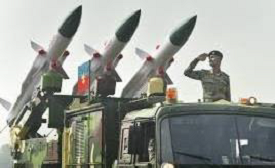
According to a report titled "Trends in World Military Expenditure, 2019" by Stockholm International Peace Research Institute (SIPRI), India has become the third-largest military spender in the world, after the US and China. The military spending of India grew by 6.8% to $71.1 billion in 2019.
The report stated that the total global military expenditure rose to $1,917 billion in 2019, which is an increase of 3.6% from 2018 and the largest annual growth in spending since 2010. Russia and Saudi Arabia complete the big-five list.
10 - 5 million displaced in India in 2019 as per GRID Report 2020
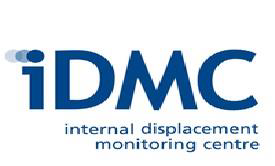
According to the Global Report on Internal Displacement, GRID 2020 released by Internal Displacement Monitoring Centre, IDMC, 5 million people have displaced in India in 2019, the highest in the world. South Asia recorded a total of 9.5 million new displacements associated with disasters in 2019.
The report highlighted that the displacements were caused due to a combination of increasing hazard intensity, high population exposure, and high levels of social and economic vulnerability.
11 - APEC economy to reduce by 2.7% in 2020
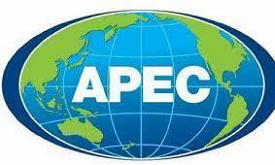
The Asia-Pacific Economic Cooperation (APEC) region is expected to post a 2.7% economic decline in 2020 due to the impact of COVID-19 as per the report by the Asia-Pacific Economic Cooperation (APEC) Secretariat. This will be the most significant fall since the near-zero growth rate logged in 2009 during the global financial crisis.
The 21-member region recorded economic growth of 3.6% in 2019. The report has however projected an economic rebound in 2021 with the anticipated growth of 6.3% , higher than the projected global economic growth of 5.8%.